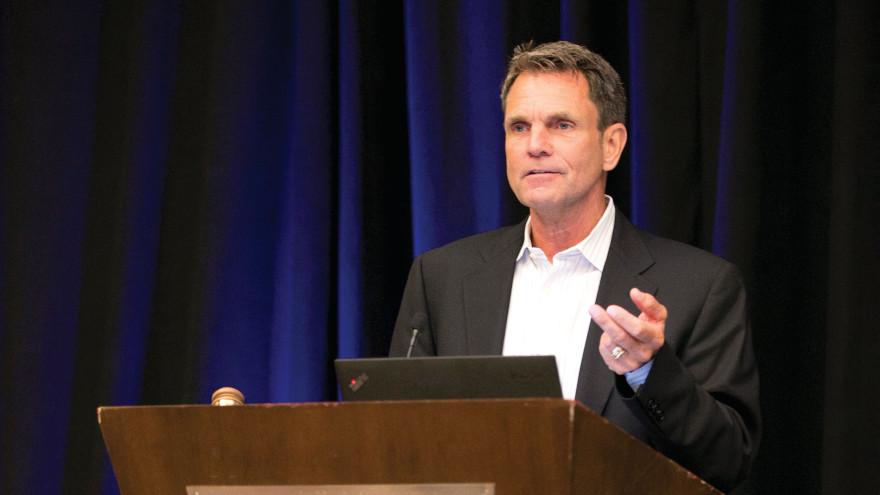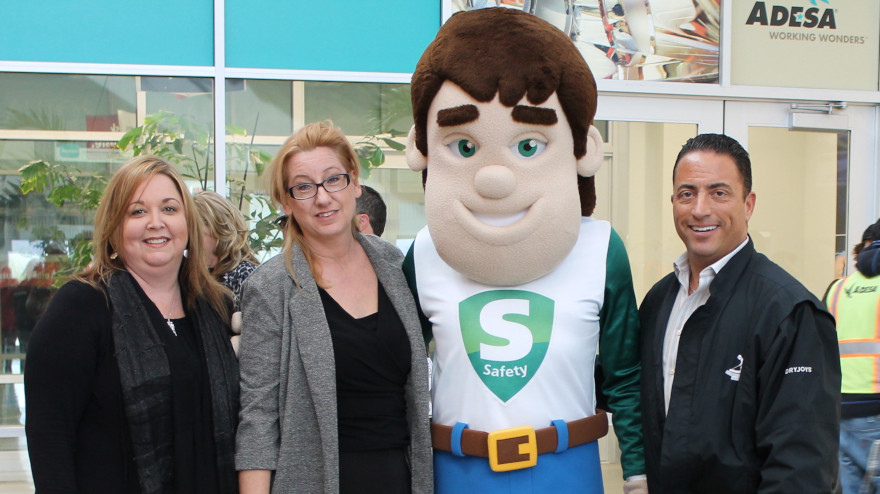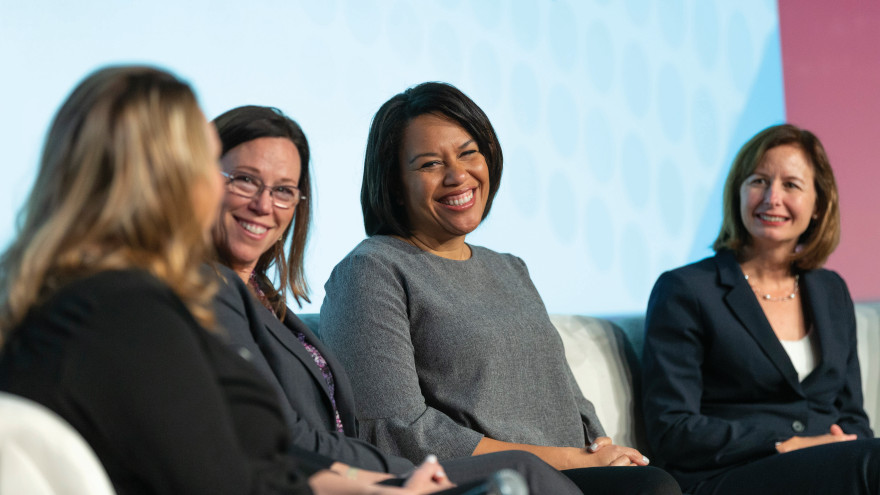The all-digital Auto Intel Summit wraps up Friday with a day of sessions on auto innovation, digital retail and the role of venture capital in auto technology.
The day begins at 11 a.m. (ET) with a panel discussion titled, “The Auto Intel Council Explores the Edge of Auto Innovation.”
Moderated by Auto Remarketing senior editor Joe Overby, the panel includes the following members of the Auto Intel Council:
- Sharon Mancero Director Asset-Backed Securitization & Lending, Wells Fargo
- Joe Oliveri, Vice President, Data-as-a-Service, KAR Global
- Jeremiah Wheeler, Executive Vice President & General Manager, Fintech, DRN
Next up will be a digital retail-focused presentation from CarNow founder Tim Cox, whose “The Future of Automotive Retail” keynote begins at noon.
The day concludes with a 1 p.m. panel on the venture capital and investment space.
The “Auto Industry Venture Capital Fireside Chat — Exploring the 2020 Environment” session will be moderated by Spiffy co-founder and CEO Scot Wingo and include the following panelists from the investment community:
- Jason Caplain, Co-Founder and General Partner, Bull City Venture Partners
- Lister Delgado, Managing Partner, Idea Fund Partners
- Steve Greenfield, Co-Founder and CEO, Automotive Ventures
For more information and to register, visit www.autointelsummit.com.
Wednesday’s lineup for the all-digital Auto Intel Summit is chock-full of sessions that touch on everything from digital retail and innovation to capital to diversity.
Following opening remarks from Cherokee Media Group president Bill Zadeits at 11 am (ET), the day begins with a panel discussion led by Sharon Mancero of Wells Fargo on “Capital, Growth, Innovation & Diversity in Automotive – An Executive Conversation.”
The panelists include:
- Jerry Bowen, head of commercial auto at Wells Fargo
- Damon Lester, president of the National Association of Minority Automobile Dealers
- Mark Olson, senior vice president of dealer finance at PNC Bank
Mancero is the director of asset-backed securitization & lending at Wells Fargo. The panel will cover important topics related to capital, growth, innovation and diversity in the automotive and auto finance industry.
After an audience Q&A, that session will be followed by a Demo Dash from Constant president and chief operating officer Carissa Robb at noon.
At 12:15 pm, the day continues with a digital retail panel moderated by CMG’s Zadeits that includes Motoinsight chief executive Andrew Tai and Rusty West, who is co-founder and president of Market Scan.
The afternoon concludes with a keynote on digital retail presented by DRAIVER president of automotive retail Anthony Monteiro, who will discuss “How can you beat Carvana at their own game?”
To learn more or register, visit www.autointelsummit.com.
Because of the COVID-19 pandemic and corporate travel restrictions, the International Automotive Remarketing Alliance has “revised its strategy” for its 2020 IARA Summer Roundtable Conference and will produce the “2020 IARA Virtual Summer Roundtable.”
“IARA’s first consideration is the health and safety of its members and guests,” IARA president Paul Seger said in a news release announcing that the Virtual Summer Roundtable will replace the original event that was scheduled for Aug. 18-20 in San Antonio.
Seger continued, “The Alliance is stronger than ever, and we aim to keep it that way.”
IARA said it will be “pouring all of its resources” into producing the virtual summer roundtable, adding many features that would not have been included in the traditional format. The alliance will offer a virtual expo hall and unique sponsor positioning, opportunities for interactions between attendees, and relevant topics and keynote speakers, in addition to bonus features and materials that registrants will be able to access even after the conference is over.
“The industry is hungry for information, and the IARA is primed to provide leadership and content for this very important lifecycle of the remarketing industry,” Seger said.
IARA expects the 2020 IARA Virtual Summer Roundtable to take place during the general timeframe as the originally scheduled meeting. The alliance will announce those details as the agenda and dates are finalized.
IARA executive director Tony Long said the alliance heard positive feedback about its recent webinar series, “The Road to Recovery.”
“But the virtual conference will be a major event that will take us to next level and reflect IARA’s prominence as The Voice of the Consignor,” Long said.
The upcoming Automotive Intelligence Summit is designed to help dealers get a better handle on the technological challenges Equifax identified on Tuesday.
A new automotive survey from Equifax finds that dealers understand digital retail solutions, but may struggle in providing such solutions to customers. The online survey polled 135 dealers around the U.S. to get a better understanding of current trends in retail transactions, credit applications, vehicle financing, fraud and their prospects of offering online digital retailing options to customers.
Equifax learned that time at the dealership continues to remain a problem for consumers looking to complete a transaction, particularly when it comes to the F&I process.
According to dealers, 45% said it still takes between one-and-a-half and two hours, while 31% said it takes between two and two-and-a-half hours to complete a deal. While 84% of dealers said they offer appointment setting online, only 27% said they can facilitate the entire deal online.
Conversely, 87% of dealers admit that customers would prefer to complete a deal online.
Additionally, 89% of dealers acknowledged that they continue to grapple with unidentifiable information in credit applications, saying they handle one to two credit applications each day that fall into this category. Dealers also remain largely focused on collecting information stated on the credit application, such as income (89%) and employment (84%).
Less than half of dealers (42%) said they are also currently collecting alternate forms of data such as property ownership or property payment histories, additional data that can be critically helpful in identifying the appropriate financing for an individual.
“There remains a distinctive gap in what dealers are currently offering and what car shoppers want when it comes to the realities of digital retailing,” said Jenn Reid, vice president, strategy and marketing leader, automotive, at Equifax.
“Clearly, there is a lot of room for improvement in speeding up the transaction process and offering a complete online transaction solution,” Reid continued. “It is also clear that dealers continue to need reliable solutions that help speed up the process with credit qualifications and fraud prevention, which continue to impact CSI scores and online reviews, and put dealers margins at risk each month.”
Fraud continues to be a challenge as well. The survey revealed that 76% of dealers are forced to handle between one to three fraudulent transactions each month, and another 19% saying between three and five transactions each month.
“Fraud comes in many forms within an automotive transaction and remains a significant concern for many dealers, illustrating the deep need for advanced digital technologies that today offer instant verification of identity, residence, and other forms of alternative data,” Reid said.
“These sophisticated technologies can reduce the threat of fraud while also improving the overall customer experience for shoppers,” she went on to say.
During AIS 2019, a collection of dealers will be discussing these topics and more.
Next month’s Automotive Intelligence Summit will have at least three of North Carolina’s most well-known and digitally savvy dealership groups on hand for a panel on “Auto Dealerships & The Digital Revolution: What’s Next?”
The session, moderated by North Carolina Automobile Dealers Association president Bob Glaser, will include:
—Eric Flow, president of management services, Flow Automotive Companies
—Erick Kirks, marketing director, Johnson Automotive
—Chris Vester, chief operating officer, Hubert Vester Auto Group
The session will delve into the digital revolution in the auto industry and what it means for dealerships.
It will examine how dealers are evolving to address the digital retailing needs of their customers, while also focusing on how dealerships are using fintech to improve their customers experience inside and outside of the physical dealership.
The panel is set for 1:45 p.m. ET on July 24.
The event agenda will also include various other angles on the evolution of digital retail presented during the three days of the second annual AIS.
—Separating the Facts from Fiction: Andrew Tai, CEO at MotoIsight, says his goal during his keynote “is to help dealers better understand the wave of change that is already upon us, but also navigate how to take advantage of it.”
—The Future of the Automotive Experience — How Unification of Technology Drives the Right Customer Journey; Craig Sims, VP, Automotive Solutions, Equifax: This session will help attendees see how today’s digital retailing tools are helping to create unification in an effort to drive the most successful customer journey.
—DR: Your Direction Determines Your Destination: The big buzzwords in automotive right now are “digital retailing”. OEMs and dealers alike are trying to navigate this new world. Tim Cox, Co-Founder at CarNow, shares a clear road map of what is working in some of the most successful dealerships in the country.
—PeteMacInnis, Founder and CEO, eLEND Solutions, will tackle the following question: Is Digital Retailing Promising More Than It Can Deliver?
—Digital Retailing and the role of FinTech; Tarry Shebesta, CEO, truPayments: Dealers, OEMs, lenders, credit bureaus, and technology providers are all jockeying for a winning position. Place your bets, and get ready for a spirited interactive discussion from session attendees.
Complete agenda and registration details are available www.autointelsummit.com.
Velodyne founder and chief executive officer David Hall has led his company’s efforts in reaching a goal of safe autonomous driving.
To do that, he has provided advanced light detection and ranging, or LIDAR, sensors at automotive grade pricing. Velodyne also launched the World Safety Summit on Autonomous Technology in 2018.
For efforts like that, Hall was one of the winners of the 2019 Ingenuity and Impact Awards from the Alliance of Automobile Manufacturers, or Auto Alliance.
In naming several winners of its Autos2050 awards in the categories of Ingenuity and Impact, the Auto Alliance noted that those leaders shaped the future of auto-mobility.
“It is important to spotlight the innovators and pioneers who are making future advancements a reality today. Their efforts and technologies have the potential to bring tremendous societal benefits—first and foremost greater motor vehicle safety, as well as greater mobility and fewer emissions,” Auto Alliance interim president and chief executive officer Dave Schwietert said in a news release.
The new awards and dinner are part of the Autos2050 event that will take place April 2 at the Andrew Mellon Auditorium in Washington D.C. The event will include a conference covering the crossroads of public policy and automotive technology. The Auto Alliance represents 12 automakers with a mission “to promote policies that allow automakers the freedom and control to build cars and light trucks that are safe, reliable, energy-efficient, clean and smart.”
“These winners were chosen for making game-changing contributions to the automotive industry over the past year, and they will be honored at the Autos2050 dinner,” Schwietert said.
In addition to Hall of Velodyne, the Autos2050 Award winners for the category of ingenuity, “for exceptional creativity and uniqueness,” are:
— Turo chief executive officer Andre Haddad, who leads a peer-to-peer car-sharing network that works to increase access to automobiles, offers owners additional income, and reduces the time autos spend idle.
— HERE Technologies chief executive officer Edzard Overbeek, who leads a company building the HD map and location-based services platform to power what the company says is next generation in-vehicle infotainment, along with connected vehicle and autonomous driving products. HERE has been a part of the industry for 30 years, working on digitizing maps for in-car navigation systems.
— HARMAN vice president automotive cyber security, Yuval Weisglass, who leads his company's vehicle cybersecurity technology development and organizational strategy across the vehicle lifecycle, from program and product design through manufacturing and deployment. The company works with automakers to implement threat analysis and technology in support of security measures for connected and autonomous vehicles.
— Watson IoT general manager Kareem Yusuf, who is building on IBM's history of working with the automotive industry by addressing topics “from the factory floor to the rubber on the road,” according to the company.
The Autos2050 Award winners for the category of impact, “for exceptional contributions to improvements in technologies, society, the environment, or the economy, are:
— Securing America's Future Energy (SAFE) founder, president, and chief executive officer, Robbie Diamond, who has positioned his organization in the area of automated vehicle thought leadership and has provided policy recommendations and testimony to legislators and agencies.
— Former National Safety Council president and chief executive officer Deborah Hersman, who has worked on transportation safety in government roles, and who advocated for the health and safety benefits of automated vehicles. In January 2019, Hersman became the chief safety officer for Waymo.
Industry peers nominated each recipient for selection by the Autos2050 Host Committee of automaker representatives.
In addition to its long history of building vehicles, Hyundai has long supported the fight against pediatric cancer. Hyundai Hope on Wheels is a 501(c)(3) non-profit organization that works to find a cure for pediatric cancer, and the automaker says Hope on Wheels is one of the largest non-profit funders of pediatric cancer research in the country.
Primary funding for the program comes from Hyundai Motor America and its more than 835 U.S. dealers, along with the 19 Hyundai dealers that comprise the Washington Area Hyundai Dealers.
On Monday, Hyundai announced a continuation of that effort, as a program with its latest Hyundai Hands-On contest will take place in April at the 2019 Washington Auto Show.
The Washington Auto Show, The Washington Area Hyundai Dealers, Georgetown Lombardi Comprehensive Cancer Center, and Children’s National will work together in putting on the Hyundai Hands-On Contest. Hyundai describes the contest as a “longtime staple of The Washington Auto Show,” and it requires contestants to remain in constant contact with a Hyundai vehicle over multiple days (with a few breaks).
The winner of this year’s contest, which is titled, “Hands on Hope: 50 Hours for $50,000,” will drive away in a new 2019 Hyundai Kona SEL.
Contestants will compete over a 50-hour contest period. A new feature of this year’s contest is that the six contestants will include employees from Georgetown Lombardi and Children’s National. The institute where the contest’s winning contestant works will receive a $50,000 grant for research toward finding a cure for pediatric cancer.
“The Hyundai Hands-On Contest has long been a hallmark event at our show,” Washington Auto Show president and chief executive officer John O'Donnell said in a news release. "We are proud to be able to use this competition to showcase the important work that our local medical centers do to help the most vulnerable among us in their greatest time of need."
‘The Washington Area Hyundai dealers are proud to support this great work, and excited that one of their employees will drive away in a brand-new 2019 Hyundai Kona SEL,” Kevin Reilly, owner of Alexandria Hyundai and representative of the Washington Area Hyundai Dealers, said in a news release.
With only 15-minute breaks every three hours, contestants must remain in contact with the Hyundai Kona at all times during the 50-hour competition. The winner will receive a new 2019 Hyundai Kona CUV from the Washington Area Hyundai Dealers.
At the end of the 50 hours, if more than one contestant is still in contact with the vehicle, the remaining contestants will select a Hyundai key from a bowl. The contestant with the one key that starts the vehicle will win the Hyundai Kona for him or herself, along with the $50,000 pediatric cancer research grant for his or her medical center. The institute that does not have the winning employee on its team will receive a pediatric cancer research grant for $10,000.
As in past years, Auto Show attendees will be able to observe the contest during public show hours.
Hyundai Hope on Wheels has provided more than $1.6 million in grants to Children’s National and more than $1.4 million in grants to Georgetown Lombardi. Hyundai Hope on Wheels has contributed more than $145 million to the fight against pediatric cancer since its inception in 1998.
“Hyundai Hope On Wheels has fueled some of the most promising cancer research projects underway at Children’s National,” Children’s National Center for Cancer and Blood Disorders vice president Jeffrey Dome said in a news release. "We are grateful to Hyundai Hope on Wheels — and all of the dealerships here and around the country—for their partnership and generous support for research in pediatric oncology."
Such awards allow Jeffery Toretsky, a pediatric oncologist and researcher at Georgetown Lombardi Comprehensive Cancer Center and past recipient of grant funding, to be more imaginative, even if approaches fail, he said in a news release.
“If we, pediatric oncologists, don’t aggressively go after novel approaches to creating drugs that are most important for targeting childhood cancer, nobody will,” Toretsky said. “Our work targeting the 'undruggable' has led to a current clinical trial in Ewing sarcoma. Hyundai Hope on Wheels has provided resources for my team to search outside the box in order to achieve new ways to treat cancer in both children and young adults.”
David Vignes, who is president of remarketing services at KAR Auction Services, believes that if you asked all 18,000 employees at KAR Auction Services, “Who is Jim Hallett?” most would correctly say that Hallett is chief executive officer and chairman of the company.
“But I can guarantee you that absolutely everybody knows Safe T. Sam,” Vignes said in an interview with Auto Remarketing.
As many people in the auction industry know, Safe T. Sam is the animated mascot of ADESA’s safety program, which is a course of short instructional videos that Vignes created. Now more than 75,000 people have been certified or recertified in auction safety through the program.
Vignes’ work on the program led to the National Auto Auction Association naming him as a Warren Young Fellow in February. The association also named Cox Automotive safety and environmental senior director Kenny Jones as a Warren Young Fellow at an awards ceremony that took place during the association's Safety Summit in Dallas.
NAAA stated in a news release that the honor recognizes Vignes’ and Jones’ instrumental roles in developing and promoting safety initiatives for the auto auction industry.
As part of the award, the association presented a $2,500 donation each in Vignes’ and Jones’ names to NAAA’s nonprofit Warren Young, Sr., Scholastic Foundation. A Fellow is a donor at that level, or someone in whose honor or memory a contribution is made in that amount to support the scholarship organization.
Vignes, Jones, and 111 others have now earned the lifetime distinction of being named a Fellow. They received a gold medal and a framed commemorative certificate. Their names will be engraved on a plaque of esteemed Fellows at NAAA headquarters.
The foundation was established in 2004 and has raised more than $2.3 million by awarding $52,000 in merit scholarships annually for full-time study at accredited institutions. The award was named in honor of Warren Young, Sr., who NAAA describes as a pioneer of the auto auction industry who retired after 35 years of service to his profession and NAAA.
NAAA president Chad Bailey said in a news release that Jones has devoted 26 years to safety. Jones has worked for the last 19 years for Manheim, where Bailey said he was “focused on building a culture of safety.”
A driver training program was one of Jones’ many safety initiatives, Bailey said, adding that the training program led to NAAA’s initial educational video, “Cycle of Safety.” It also led to safety leadership instruction and safety process evaluations, Bailey said.
Jones also oversaw a campaign in 2018 that resulted in all Manheim auto auctions becoming 100-percent safety certified, according to a news release.
“The course of short instructional videos has become the industry standard and, thanks to KAR generously making it available free to all our members, more than 75,000 people have been certified or recertified in auction safety,” Bailey said.
Commenting further about Vignes’ work on the Safe T. Sam program, NAAA stated that as Vignes’ cartoon image began branding the safety program’s materials, Vignes worked to increase the program’s impact by having Safe T. Sam make personal appearances at auctions. Vignes dressed as the character and toured the auctions. His visits began to go viral on social media, spreading the message of safer auctions.
“Vignes had a mascot costume made, and Safe T. Sam was born,” NAAA stated in a news release.
Vignes' work on Safe T. Sam was inspired by his 16 years as an executive with the Walt Disney Corporation prior to joining ADESA in 2007, and he told Auto Remarketing, “It’s amazing to see the power of a character.”
KAR eventually provided the program for free to all our members, “because we believe it’s the right thing to do,” Vignes told Auto Remarketing.
“When we started, it was an internal program with ADESA,” he said. “We never expected it would take off like it did.”
There are lots of opportunities for innovation in the used-car space for dealers.
In fact, some may say it is a hotbed for new ideas.
“I think a lot of the most exciting trends in automotive buying are going to be led by used-car retail,” Aaron Krane, the chief executive of Drive Motors, which develops online car-buying solutions for dealer groups and banks, said in a phone interview.
“So, I think the used-car space is actually oftentimes the vanguard for (innovation), whether it’s online buying or any of the other new experiments in that space.”
One example is the work dealers are doing with Drive Motors, which gives dealers a way to turn existing websites and stores into digital buying platforms.
“But that’s only one, let’s say, vector of innovation that used dealerships are exploring. That’s the one that we happen to offer, but there are others as well,” Krane said, going on to mention things like on-demand test-drives and retargeting.
Over at the EchoPark Automotive line of used-car standalone stores (the focal point for Part I of this story) one potential area for continued innovation is online sales.
Jeff Dyke, who is president of EchoPark and parent company Sonic Automotive, said in a November interview that EchoPark prefers for 90 percent of the deal to be complete before the customer gets to the store. They have not yet launched tools that would let the consumer do the entire transaction online (as of that interview), but at the time of that interview in late November, Dyke was set to show that technology to the executive team.
One of the pluses to the technology that EchoPark and Sonic have is that they utilize their own appraisal system, whereas most companies that sell cars online use an outside system, Dyke said.
With EchoPark’s process, customers would be provided a car-cash app through the app store, where they would take a photo of their vehicle, just as an EchoPark associate would at the store.
“They can fill out the same condition report, and it will go straight from the customer to our RTC, and our RTC will respond back to the customer,” Dyke said. “And so they’ll get that information, and then they can complete their own transaction online, set up their own financing, do everything right there online. We’ll sell them the products online, the whole nine yards,” and then the consumer can pick up at store, he said.
As for delivery, there “probably” will be a day where that happens, but it makes things more complex, and they’re not quite there yet, Dyke said.
“I’ve got five priorities in my new role as president of this company, and one of them is to be able to sell online — but to do it really good, and to have the same experience, the same culture in your Web visit as you do in your brick-and-mortar visit,” Dyke said.
Sonic’s peers certainly have noticed the importance of this space.
AutoNation was the lead investor in an $146 million funding round for online car retailer Vroom, which officially announced the Series G round in December. AutoNation had announced its piece of the investment in late October, saying it obtained roughly a 7-percent ownership stake in Vroom after a $50 million strategic investment in the online car retailer.
With its $54 million investment, Lithia led the $140 million round of Series D financing in online marketplace Shift that was announced in September. Lithia and Shift also formed a strategic partnership, and Lithia president and chief executive Bryan DeBoer joined Shift’s board of directors. In October, Lithia said it had acquired more equity interest in the online marketplace.
Krane, the Drive Motors chief executive, said he believes this will be the year that, “online car buying reaches and passes the tipping point.”
“2019 is the year where every dealership realizes they need online car-buying, just like every dealership realized a decade ago they needed a website with inventory,” Krane said. “We see this on every level, from the manufacturer through the large publicly traded dealer groups on down to the smaller one- and two-store dealer groups. Quite frankly, 2019 is just the year that I think the entire market embraces online buying, and of course, they’re going to embrace it in various ways.”
Some groups might utilize third-party platforms, some might utilize subscriptions, while others might bring online buying to their existing experiences, which Krane believes will be most common.
“Much like we’ve seen in every other vertical, there will become an arms race or a land grab or whatever you want to call it,” he said. “And the early movers are going to benefit, much more than the mid-to-late movers. 2019 is probably the last window to be an early mover in online buying for dealerships.”
A walk through the customer-facing side of the EchoPark Automotive store in Charlotte, N.C., has the feel of a cafe, not a car dealership.
The employee work area, separated from the consumer-facing front, has the trappings of a young, tech-leaning startup.
But the innovation of this store and its fellow EchoPark locations go well beyond appearance.
These standalone used-car stores, launched by the publicly traded Sonic Automotive dealer group, take a new approach to auto retail — perhaps representing, on a larger scale, the shifting sands of how dealerships operate.
This innovative way of thinking was evident in a late November interview at the Charlotte store with Jeff Dyke, president of EchoPark and Sonic, and Sanjay Prakash, the location’s general manager.
Everything from inventory pricing to employee management at EchoPark is a bit different than what you might find at a traditional car dealership.
Buy smart, and in bulk
Take, for instance, how these stores find inventory.
“We source everywhere, but we try to buy in bulk,” Dyke said. “And the best way to sort of think about how we buy is, you go to a meat market.
“And at the meat market, there’s chicken and steak and hamburger and sausage and you name it,” he said. “We look for what’s on sale today.
“We don’t necessarily buy to a, ‘Hey, here’s what the customer wants’; We buy to a price-point, so that we can create a really low price-point that brings the consumers into the store,” Dyke said. “And that’s everything — you’ve got to get the right price on a car.
“And once you hit that, it really drives the volume. And why others have a hard time replicating that is the expense. The process: You have to be able to buy the car, ship the car, recon the car, detail the car, take the pictures of the car, get it on the front line and get it out fast,” he said. “And if you have any disruptions to that, like a big holiday sale, where you sell a ton of cars, it throws everything off.”
Establishing a rhythm in buying is key in inventory management for EchoPark. So is consistency. Buying to a number. And not over-buying.
“You’re going to sell more cars on a Saturday than you do on a Thursday, but we know those rhythms, so we buy in conjunction with that,” Dyke said. “And we try not to over-buy; we do have projections for what we think we’re going to sell the next week, and we try to buy to that number. And then the next week, buy to that number.
“Everything is done by week, so that we keep a consistent flow of inventory. And that’s critical. Inventory management is imperative in order to be able to be profitable in a store like this.”
Pricing right
So, too, is pricing of that inventory, which Dyke said is based on algorithms built internally and on data points from what is happening in the market.
An example of that is the electronic hangtags on the vehicles. When the company’s internal pricing system changes the prices, that change is automatically reflected on the hangtag.
The EchoPark managers don’t have to worry about buying inventory or pricing cars.
“They might give opinions on a car here or there, but overall, their job is to manage the associates and to manage the guest experience,” Dyke said. “And we have an inventory team and a pricing mechanism that handles everything else.”
The fact that the majority of the technology at these stores was developed internally means that making changes is typically easy, inexpensive and efficient, Dyke said.
“It’s amazing how intertwined everything else is, too, and how much math and science is involved,” said Prakash, the manager of the Charlotte location. “You think of inventory, purchasing and pricing, and then how it’s attached to recon and then attached to sales, it’s all intertwined. They all move in unison.”
Lessons learned
Innovation, as it turns out, can be an evolving process. Since launching EchoPark Automotive in 2014, Dyke said there have been a number of lessons learned about how these standalone used-car stores should operate.
For instance, days’ supply should in the low- to mid-20s at the stores, as opposed to the 29- to 32-day range for Sonic’s new-car business. Also, pricing right from Day 1 is paramount. Don’t overbuild.
“We tried to put this exact process in our new-car stores. But to take that culture and to convert it into this culture with the same people? Mistake. We learned that. You can’t do that,” Dyke said. “We’ve taken the technology out of the new-car stores and put it in here; that’s worked very well. But certainly, hiring from day one and testing and making sure that you’re bringing the right people into the organization and lots of training before you open — it’s been an earmark for us from day one, but it’s just gotten a lot better as we’ve moved forward,” Dyke said.
“The people piece, the inventory piece. Don’t overbuild the facility,” he said, pointing out that a facility can be nice without being massive.
“And we don’t have to have tons of people. Our technology allows us to sell two-and-a-half times what a traditional salesperson would sell in a regular store” where an associate might sell eight to 10 vehicles a month, he said.
“It’s not about how many people you add; it’s about how efficient you can be,” Dyke said.
Store openings?
As far as store additions, the company aims to open one more location in March, putting its EchoPark store count to nine, and then they will likely “take a breather” for the rest of 2019 to focus on execution, Dyke said.
“What we want is for the nine stores to be profitable, and when we add a store … we stay profitable, and then you just build on that,” Dyke said.
Starting next year, Sonic plans to start adding two to five stores annually, “depending on what our capabilities are and the performance of the organization,” he said.
They want to grow, but do so profitably.
“Speed to market is really important, but when you have a formula like this, and you know that you can open up a store and it’s going to sell 300 cars and it’s a very, very good chance that it could break even in its first month, I’m not worried about the rest of the world anymore,” Dyke said.
“I’m worried about how much can our people take on, and how much complexity do we put in front of them, how simple we can make it and the ease of opening stores,” Dyke said.
“We know how to scale,” Dyke said. “I did it at AutoNation, I’ve done it at Sonic Automotive. Scalability is one of our strengths. And our biggest strength is inventory and pricing. We really understand the inventory. All of our systems are all built internally. So, if you can scale, you can hire and train, and you can manage inventory; it puts you in a situation that gives you a pretty good competitive advantage.”
Establishing culture
Another competitive advantage that EchoPark prides itself on is its workplace culture. Instead of spending 30 percent of his time working with employees and 70 percent on other tasks, Prakash said he spends 90 percent of his time coaching, teaching and working with the team at the EchoPark Charlotte store.
In fact, in a recent survey where team members could give feedback anonymously, they were asked what three words they would use to describe the culture at the store. The top response in the heat map of words was “family.”
“That’s really good to see as a GM and a leader of the team to see that we’re living the values. And to Jeff’s point, it’s about reducing complexity. I’m allowed to focus on a lot of the activities that generate that,” Prakash said. “I don’t have to interact with a lot of guests, if I provide them with this, just like Jeff provides it for me, they’re going to automatically be engaged every day.
“We’ve got mechanisms to keep us focused on the most important activities of the day, which is developing operating rhythms, making sure we’re working with the people, making sure our building’s tight and right all the time and our message to the community is good,” he said. “That’s all we focus on. We don’t have a lot of other side science projects that take our eye off the ball.”
For more, see Part II of this story.
Consumers want a car-purchase process that is seamless, streamlined and limits their in-dealership transaction time to an hour or less.
That means allowing consumers to compare interest rates, electronically sign credit applications and other documents and shop for finance and insurance products all on a dealership’s website before stepping foot into the dealership.
OK, so the industry isn’t completely there yet — but some financial technology is.
That was the general consensus of financial industry experts, technology providers and other big thinkers, who gathered for Used Car Week in Scottsdale, Ariz., Nov. 12-16.
“We’ve defined the problem quite well; consumers want the information; they want a fast transaction; they want to have it all arranged before they get into the dealership, but I don’t think we’ve totally solved for that,” said Andrew Stuart, president and CEO at TD Auto Finance, during a sideline interview at the conference.
In its search for solutions, TD Auto Finance has been in talks with a number of financial technology startups and struck a deal to become a preferred lender with AutoGravity, a digital vehicle-shopping and financing platform, Stuart said.
“As lenders we’re going to have to make a number of small bets with some of these fintechs that are trying to solve for what consumers want,” he said.
“There are a lot of companies nibbling around the edges trying to figure it out. With enough attention and focus it will get solved.”
Seeking solutions
Also seeking solutions is Cox Automotive.
Take consumer credit applications, for example.
Andy Mayers, Cox Automotive lender solutions strategist, said credit application information is typically gathered from consumers and then entered into dealership computers by dealership F&I managers.
But credit applications submitted on dealers’ websites by consumers using Cox Automotive’s Accelerate digital retailing platform saves time, even if it would have taken an employee just five minutes to enter the information, he contends.
“If you sell 100 cars a month, that’s 500 minutes you just saved by having a consumer enter that data,” Mayers said, during an interview.
“It’s incremental. For an F&I manager, for a dealer, time is money. The more they’re doing administrative things, the less time they are selling.”
Mayers also said dealers are open to giving consumers more information about F&I products online, but worry that F&I sales, a major profit source for dealers, will suffer and consumers will miss out on valuable products.
“If you talk to dealers, some are afraid that consumers will opt out of buying things, such as service contracts and (guaranteed asset protection) products,” Mayers said. “Service contracts can be a valuable tool for a consumer to cover their expenses for costly maintenance.”
To bridge the consumer’s online and in-dealership experience, Cox Automotive’s Dealertrack created uniFI, a dealer-facing software platform that integrates with Accelerate, Mayers said.
As an open platform, uniFI can facilitate the entire car-buying journey of credit, contracts and aftermarket sales, he said.
Though much of the vehicle purchase process, such as trade-in appraisal, test drives and vehicle registration and titling paperwork, are typically conducted at a dealership, “technology is getting there,” when it comes to allowing consumers to do it themselves online, Mayers added.
F&I on dealers’ website
Tammy Linkfield, senior vice president, central region, at Ally Financial, said consumers shop, research and gather information about vehicle purchases online, but “at the end of the day they come back to the traditional automotive dealer.”
“We continue to work with dealers and helping them to have a spot for F&I on their websites and things of that nature to improve that experience,” said Linkfield during the panel discussion: “Auto Fin Executive Roundtable: The Next Steps for the Industry.”
Also on that panel was Jim Money, president of Automotive Finance Corp., who said taking advantage of things such as artificial intelligence and mobile apps “take the mundane out of the process” and help streamline the wholesale vehicle buying and selling for dealers.
“Mobile technology is extremely important,” he said. “It allows the dealer to buy and sell (used vehicles) and pay down and gather information on their accounts.
“Dealers are looking for ways to source their inventory. There are traditional brick-and-mortar (auctions), but virtual lanes are becoming much more important.”
Fintech’s impact is 'dramatic'
Fintech was a hot topic among auto finance executives during a panel discussion that honored them as leading Women in Auto Finance.
Katherine Adkins, Toyota Financial Services group vice president, general counsel and secretary, said fintech is dramatically changing auto finance.
She said companies that don’t adapt and grow risk being among the “Kodaks of the world,” referencing the once-dominate camera company’s near-death experience resulting from its failure to switch its photographic technology from film and paper to digital.
Adkins also cautioned that financial technology is way ahead of regulation, which could eventually present problems.
“The rules aren’t written yet and the business wants to go there. So how do you facilitate them going there without setting up a situation where you end up hurting yourselves?” she said.
More technology, more legal and compliance issues
Panelist Sharon Mancero, senior vice president, Wells Fargo Preferred Capital, predicts that technology will be at the forefront of career opportunities available in auto finance, but agreed that more technology will create more legal and compliance issues.
“The more we lead with technology, the more we go ‘ooh, nobody ever thought about; what do we do with all this data?’ she said.
“It’s all consumer data. There are privacy and regulatory issues. Where do you store it? How do you use it? When not to use it? Legal and regulatory is a big area that we need to continue to pay a lot of attention to.”
Georgine Muntz, board of directors member, defi SOLUTIONS, a provider of loan origination software, said the industry is being challenged by a lack of agility and outdated technology.
She said when an online used-car retailer such as Carvana — which allows consumers to find, finance and arrange delivery of a used vehicle online without stepping into a dealership — can be created and go public “faster than a traditional lender can change out a core system, you have to think there is a problem.”
The industry must become nimble and take advantage of the new technologies for payments and electronic documents, said Muntz, who was also a Women in Auto Finance panelist.
“These are the things we have to take a hard look at and find ways through legal and compliance to allow for these changes to happen,” she added.










